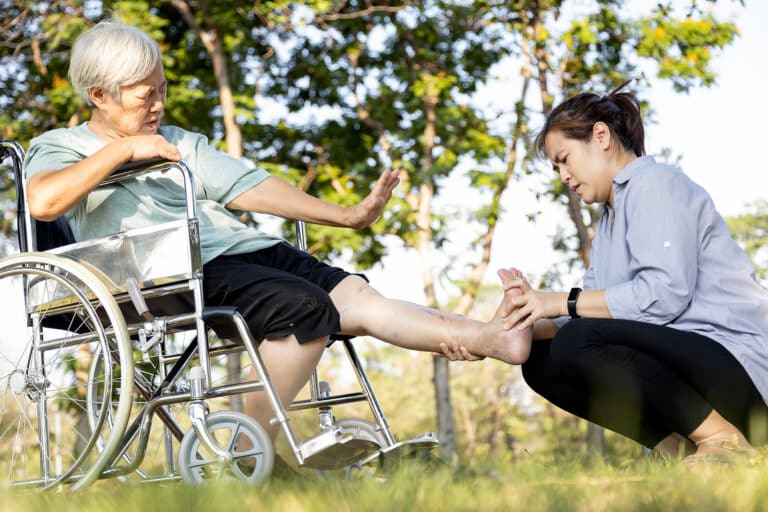The body goes through many changes as it ages. One problem that bothers many seniors is muscle cramps. These painful, uncontrollable muscle twitches can cause them to struggle in their daily tasks and make it hard to get a good night’s sleep. The good news is that there are tips the home care team can offer to help seniors prevent and treat muscle cramps in many instances.
Understanding Muscle Cramps in Older People
Before looking for answers, it’s important to know why older people get muscle cramps:
- Dehydration: Because of changes in their bodies, older people are more likely to become dehydrated. Dehydration can cause muscle cramps, so it’s important to drink enough water. When seniors struggle with this, the home care team is there to gently encourage them and monitor them to ensure their daily intake is consistent.
- Medications: As a side effect, some medicines can make muscle cramps worse. Since seniors often take more than one, it’s important to keep an eye on how their medications combine with each other and which one might be causing issues.
- Inactivity: As people age, they tend to move around less. This kind of inactive living can make their muscles weak and give them cramps. While the last thing they might want to do is move, it’s crucial to keep the cramps at bay and for their overall health. With home care in the home, they gain the encouragement needed to get up and move throughout the day.
- Lack of Nutrients: Older people may not have enough of some minerals, like potassium, calcium, and magnesium, which can make muscle cramps more likely. To assess if this is the case, they can talk with their medical team about their diet and changes that can be made or about supplements to inquire if they might help.
- Other Health Problems: Long-term health issues like diabetes, peripheral artery disease, and kidney problems can make muscle cramps worse in older people.
How Can Seniors Avoid Muscle Cramps?
Some of the answers are provided above, such as drinking more water, moving more, and getting enough nutrients. It can still be challenging to determine why muscle cramps happen, which is why a strong support team is necessary. When loved ones, home care, and the medical team work together, they can help seniors recognize cramp triggers and take steps toward preventing them. They can also provide much-needed treatment, especially when seniors are in a large amount of pain.
Treatment suggestions are offered below, but these should also be explored with the medical team:
- Using Heat: Muscle cramps can be eased by putting heat on the muscles that hurt. Seniors can feel calm and relaxed with heating pads or warm baths.
- Body Massage and Self-Massage: A light massage can help loosen up a tight muscle. Seniors can also learn easy ways to utilize self-massage to get rid of cramps.
- Add Electrolyte Drinks: Plain water might not always be enough to replace the fluids that seniors lose. When talking with the medical team, it might be suggested to add drinks with electrolytes.
Muscle cramps can be very painful and annoying, especially for older people. By helping them deal with the root causes and using these useful tips, they can help them feel better and live a more comfortable and busy life without having to deal with painful muscle cramps. It’s easy to see how the right support from loved ones and the home care team can help seniors in many ways.
If you or an aging loved one are considering Home Care in Southern Pines, NC, please contact the caring staff at Affordable Family Care.
Serving Raleigh, Greensboro, and the surrounding areas in North Carolina. Call today (919) 676-1070
- The Benefits Of Home Care For Seniors With Arthritis - April 9, 2025
- Does Your Mom or Dad Need 24-Hour Home Care? - March 27, 2025
- Why Sun Protection Is So Important For Seniors - March 7, 2025







